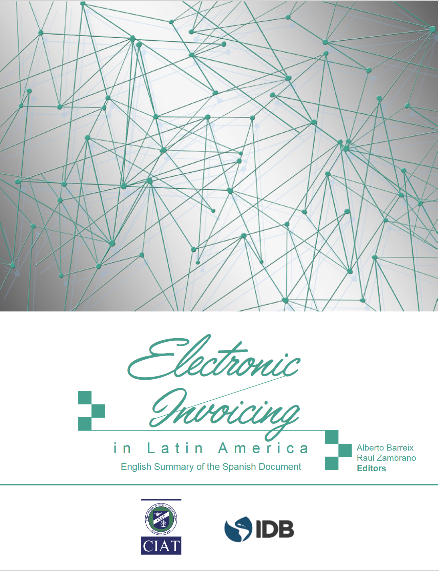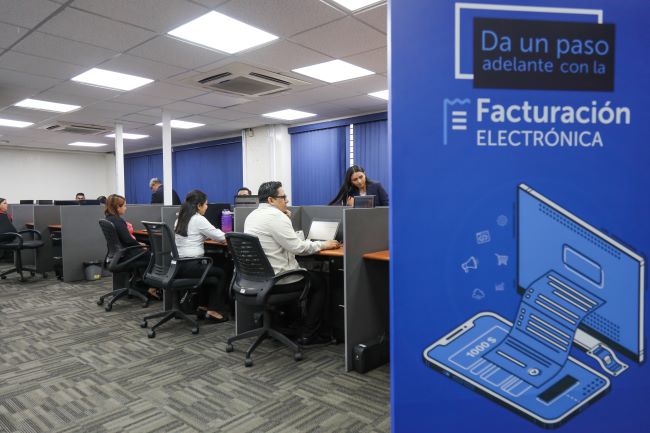Over the past two decades, electronic invoicing (e-invoicing) has transformed tax administrations worldwide. This innovative solution was created in Latin America and first launched in 2003 in Chile, and then in Brazil and Mexico. Since then, this digital transformation has significantly increased transparency and tax collection and reduced economic informality in many countries.
The Inter-American Development Bank (IDB) has backed the process of adoption and refining e-invoicing in Latin America. Over the past 20 years, the bank has provided technical assistance and financing to implement e-invoicing in 17 countries[1] and in all Brazilian states, in coordination with other international organizations, notably the Inter-American Center of Tax Administrations (CIAT).
The example set by Latin America inspired other economies on all continents. South Korea implemented e-invoicing in 2011, and Italy made it mandatory for all B2B (business-to-business) and B2G (business-to-government) transactions in 2019. India has implemented it, and Rwanda, developed a successful system in partnership with the private sector, despite having limited resources.
Nearly 90 countries worldwide are currently rolling out e-invoicing, including the European Union, which plans to standardize its use for intra-EU trade within the next decade.
What is E-invoicing?
E-invoices digitally record financial transactions between sellers and buyers, with real-time participation from the tax administration. E-invoicing:
- Increases traceability and control to detect non-compliance better and increase taxpayers’ perceived risk of penalties;
- Reduces costs for taxpayers by avoiding the need to print, store, and send physical invoices, and for tax agencies by eliminating the need to issue notifications or verify the information self-reported by taxpayers;
- Promotes formality, reducing costs and simplifying taxpayer compliance.
- Enables more cross-cutting audits, making it easier to check information against other taxes, such as income tax and excise taxes.
How E-invoicing Impacts Tax Collection and Informality
Evidence shows that e-invoicing has enhanced tax collection and helped reduce informality. According to a 2018 publication by the IDB and CIAT , in Mexico revenues declared increased 14% in the three years after e-invoicing became mandatory. Uruguay collected an estimated 3.7% more in VAT and corporate income tax in 2017, when e-invoicing became widely mandatory. After Peru made e-invoicing compulsory, taxable sales reported to the tax authority increased by 7% and purchases by 5% in the first year.

In El Salvador, e-invoicing has helped increase VAT collection to 8.7% of GDP in 2023 compared to 3.5% in 2017, according to the Ministry of Finance. And in Brazilian states that were among the first to adopt e-invoicing, with support from the Bank’s PROFISCO program, e-invoicing contributed to a 12% increase in tax revenue and a 2% reduction in informality.
Because of e-invoicing’s advantages, countries have begun using the same concept in other areas of tax collection, such as electronic payroll for social security contributions and waybills.
Beyond Audits: Public Services and Transparency
The enormous amounts of data that e-invoicing generates have allowed tax authorities to become useful digital service providers for both the economy and taxpayers. E-invoicing data on product and service prices enhances transparency and makes markets more dynamic. For example, the Lower Price Brazil program in 14 Brazilian states allows consumers to leverage this data to compare the prices of nearby products in real time.
A groundbreaking experience in Rio Grande do Sul uses e-invoicing data to set reference prices for public procurement, making government spending more transparent and efficient. Other Brazilian states are also successfully emulating this method.

E-invoicing has also invigorated access to credit in the private sector, especially for small and medium-sized enterprises (SMEs). SMEs in countries like Chile, Brazil, Peru, and Uruguay can increase their liquidity by selling their validated and unpaid e-invoices to third parties through factoring.[2] In Mexico, 46.6% of SMEs made use of factoring in 2023.
For economic policymakers, e-invoicing enables real-time economic monitoring, allowing them to break down transactions by sector and geographic area. This capability makes it easier for the government to anticipate economic trends and design micro- and macroeconomic policies, as explained in this IDB publication.
Finally, strategic use of data from e-invoicing strengthens regulation and anti-trust efforts, thus improving efficiency and fairness by making it easier to quickly detect abuses of market power or price collusion by oligopolies. It also enables tax innovations like personalized VAT, which can offset VAT’s regressive impacts by giving tax refunds to vulnerable segments of the population, thus transforming tax policy into an effective tool for social inclusion. It is worth noting that managing this huge amount of information requires a significant effort from the tax administration on data analysis and storage.
A New Role: Tax Administrations as Economic Intelligence Agencies
Modern tax administrations have e-invoicing, which provides them with detailed records of all economic transactions, along with domestic and international access to taxpayers’ banking data. They can access this information through automatic information exchanges between jurisdictions, which already occur between 140 countries. This international cooperation makes it easier for tax administrations to get accurate financial data from other jurisdictions, including information on beneficial ownership of companies that operate locally.

According to a 2024 study on the future of tax administrations published by the IDB and CIAT, effective e-invoicing systems and comprehensive access to banking information enable tax authorities to go beyond their traditional role. This precise information on residents’ financial flows and wealth allows tax administrations to optimize their collection function and become economic intelligence agencies that can analyze and anticipate economic trends.
E-invoicing as a Driver of Digital Transformation: Tax Administration 3.0.
To capitalize on this information from e-invoicing and manage taxes more efficiently, countries must first reform and strengthen their revenue services.
The IDB actively supports the modernization initiatives of several countries in the region according to the Tax Administration 3.0 model. This model makes advanced use of data and automation in areas including digital identity, contact with taxpayers, managing data bots according to international standards, managing tax rules intelligently, developing new technical skills among staff, and updating institutional governance frameworks to adapt them to the digital era.
Building the Tax Administration of the Future
Reaching this potential requires three institutional changes:
1. A redefined role for tax administrations. Traditionally, tax administrations have had three main functions: collection, auditing, and control, with IT playing a supporting role. With e-invoicing, technology becomes a cornerstone. This change requires specialized data science professionals and a more flexible and adaptive operational culture. The focus should shift from ex-post audits to proactive steps that promote voluntary compliance, like providing pre-filled returns and digital accounting records. Close collaboration with private technology firms is also key, especially for cybersecurity and to avoid breaches that could compromise tax secrecy.
2. Structural adaptations at tax administrations. For smart data use, tax administrations need a single entity that centralizes big data from customs, social security contributions, subnational administrations, public registries, and national and international financial records, ensuring comprehensiveness and interoperability. Other entities should focus on their specific institutional functions, while the tax administration does most of the tax management work.
3. Institutional protection of taxpayers’ rights. To maintain society’s and taxpayers’ trust, it is essential to strengthen privacy, due process, and equality before the law. Countries need effective transparency and accountability mechanisms to keep this trust, including external bodies like a specialized ombuds office that monitors and ensures respect for these fundamental rights or a special congressional oversight committee.
An Ongoing Transformation
Electronic invoicing, a Latin American innovation with global reach, is revolutionizing how taxes are managed around the world by making tax collection more efficient and transparent and reducing informality. But its scope goes far beyond taxation: it has sparked broader institutional transformations as tax administrations evolve into smart agencies that strategically leverage data to anticipate economic trends and optimize government work.
The digitization driven by e-invoicing has positioned tax administrations to participate in their countries’ economic and social development, generating valuable information for more effective public policies. Examples such as personalized VAT or pre-filled returns show how these advances can improve tax compliance and enhance services.
As more countries adopt and refine this digital tool, they must continue to collaborate with partners like the IDB to ensure that e-invoicing remains a robust way to promote economic growth, greater institutional transparency, and fair taxation, which will benefit the whole society.
To learn more about the IDB’s work with tax administrations, please visit our webpage on fiscal management.
Subscribe to our newsletter to stay updated on our latest publications, blogs, and events. Be sure to select the newsletter option after choosing the topic of fiscal policy and management.
Related publications and articles
The Future of Tax Administrations Lies in the Intelligence Generated by Big Data
Revolutionizing Taxation: Tax Administration 3.0 Is Here
Electronic Invoicing for Estimating Reference Prices for Public Procurement in the Health Sector
[1] The countries that already use e-invoicing are Brazil, Argentina, Paraguay, Uruguay, Bolivia, Ecuador, Peru, Colombia, Chile, Guatemala, El Salvador, Panama, Costa Rica, Dominican Republic, and Mexico. Belize and Honduras are currently in the process of implementing e-invoicing or are about to start the process.
[2]Factoring allows companies, usually SMEs, to immediately receive part of the money that customers owe for unpaid invoices and thus obtain a new source of financing. Since after a short period the e-invoice becomes a tax debit for the seller and a credit for the buyer, it is validated by the tax authorities as a confirmed commercial debt, so the creditor can trade it as a financial asset on a secondary market.


Leave a Reply